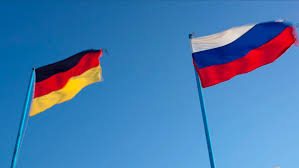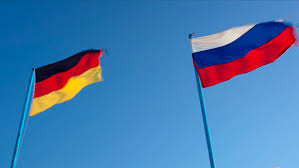
Amid a debate over it the German government should suspend the Nord Stream 2 pipeline from Russia to Germany over the issue of the poisoning of a Kremlin critic, German Economy Minister Peter Altmaier has raised questions about the effectiveness of the sanctions on Russia that are being debated.
The poisoning of Alexei Navalny was condemned by Altmaier as a “cowardly assassination attempt on a Russian citizen in Russia” in an interview on an ARD talk show, and added that it was necessary to clear up the circumstances.
While not ruling out the option of imposing sanctions on Russia at some point in the future, Altmaier added that he also believed that it was important to keep open communication lines which in some occasions can be more effective.
“We need to clarify what we are trying to achieve with our sanctions. Is it just a matter of looking in the mirror or is it something positive for human rights?” he said late on Monday evening.
Altmaier added that sanctions often lead to a “hardening of politics” and that has been his experience in politics.
“I don’t know of any case where a country like Russia, or a similar country, has been moved by sanctions to change its behavior in the past.”
There is pressure from members of her conservative party on German Chancellor Angela Merkel for suspending the Nord Stream 2 pipeline which is a magnanimous project aimed to increase the export of Russian gas to Germany by two fold. More than 90 per cent of the project has been completed and is expected to start operations from early 2021.
Merkel’s spokesperson said on Monday that imposing of sanctions on Russia had not been ruled by the German Chancellor.
But from a legal perspective, it would be almost impossible to halt the project, said the head of the German Eastern Business Association in an interview to Deutschlandfunk radio on Tuesday.
“Legally, I think that is hardly possible. All permits have been granted, the contracts are watertight – not only in Germany, but also in five countries plus under European regulations,” Michael Harms said.
(Source:www.financialpost.com)
The poisoning of Alexei Navalny was condemned by Altmaier as a “cowardly assassination attempt on a Russian citizen in Russia” in an interview on an ARD talk show, and added that it was necessary to clear up the circumstances.
While not ruling out the option of imposing sanctions on Russia at some point in the future, Altmaier added that he also believed that it was important to keep open communication lines which in some occasions can be more effective.
“We need to clarify what we are trying to achieve with our sanctions. Is it just a matter of looking in the mirror or is it something positive for human rights?” he said late on Monday evening.
Altmaier added that sanctions often lead to a “hardening of politics” and that has been his experience in politics.
“I don’t know of any case where a country like Russia, or a similar country, has been moved by sanctions to change its behavior in the past.”
There is pressure from members of her conservative party on German Chancellor Angela Merkel for suspending the Nord Stream 2 pipeline which is a magnanimous project aimed to increase the export of Russian gas to Germany by two fold. More than 90 per cent of the project has been completed and is expected to start operations from early 2021.
Merkel’s spokesperson said on Monday that imposing of sanctions on Russia had not been ruled by the German Chancellor.
But from a legal perspective, it would be almost impossible to halt the project, said the head of the German Eastern Business Association in an interview to Deutschlandfunk radio on Tuesday.
“Legally, I think that is hardly possible. All permits have been granted, the contracts are watertight – not only in Germany, but also in five countries plus under European regulations,” Michael Harms said.
(Source:www.financialpost.com)





